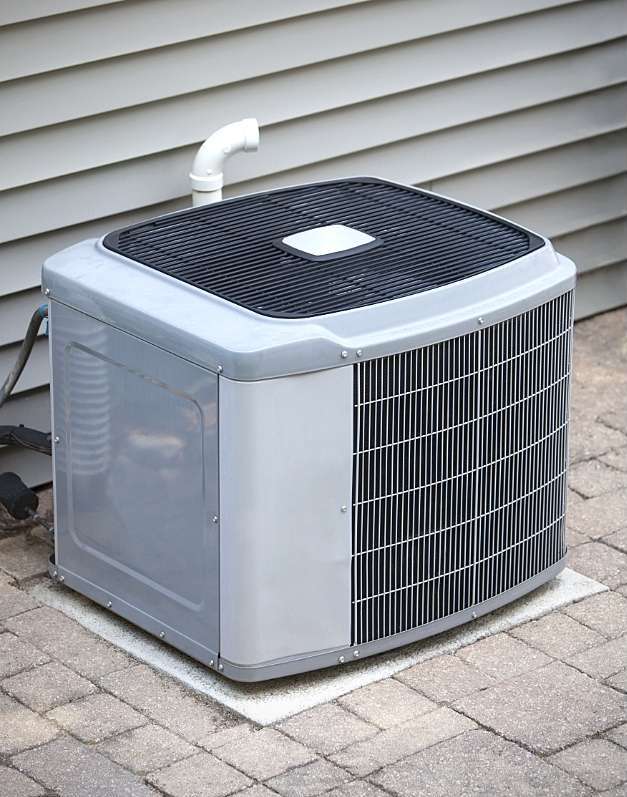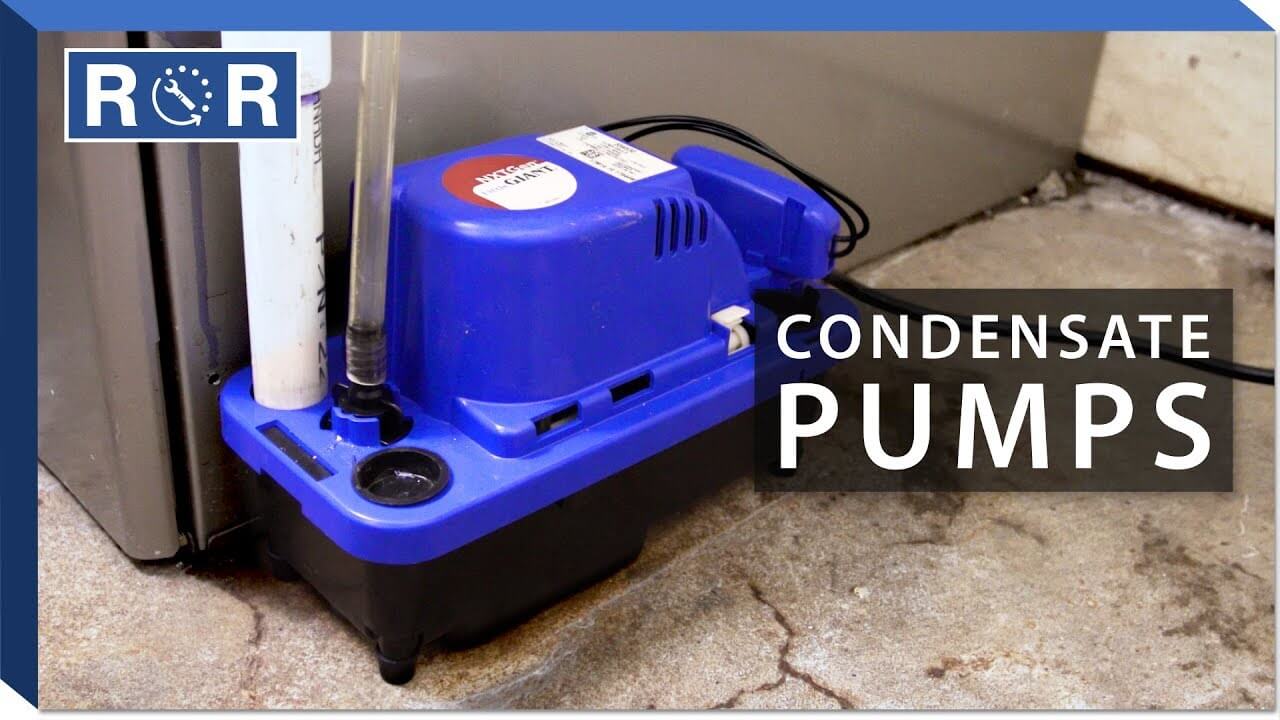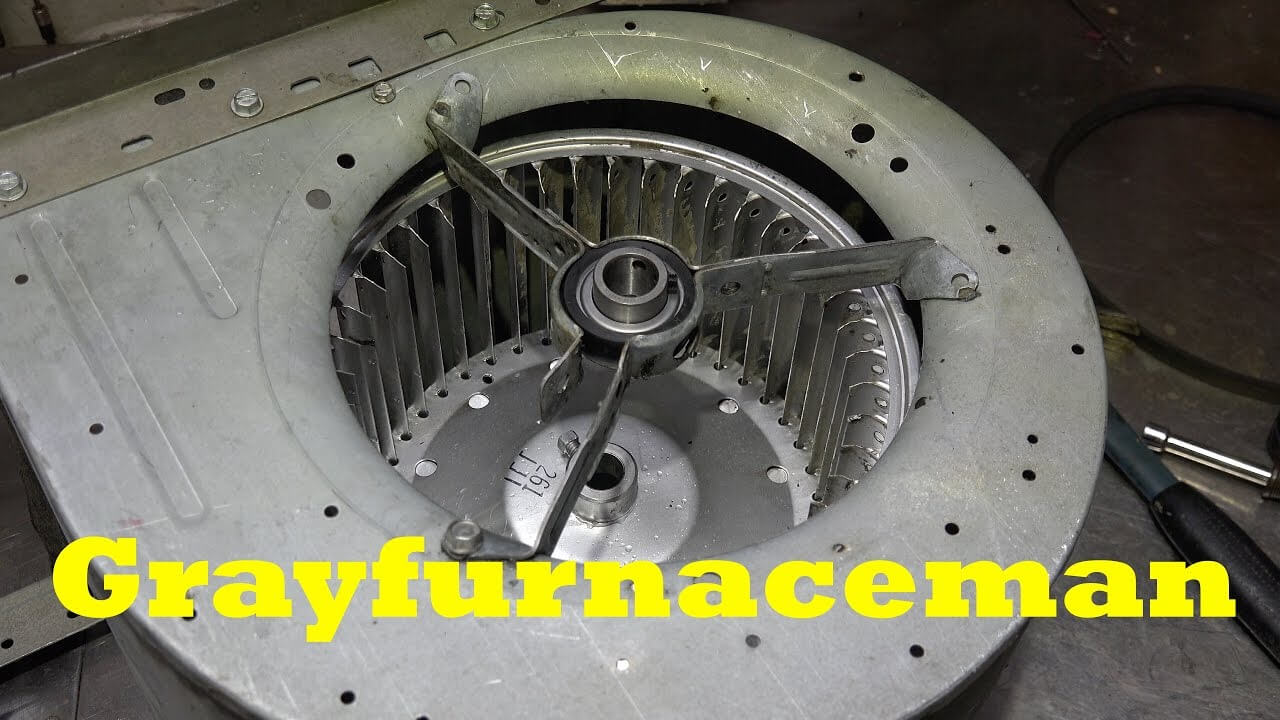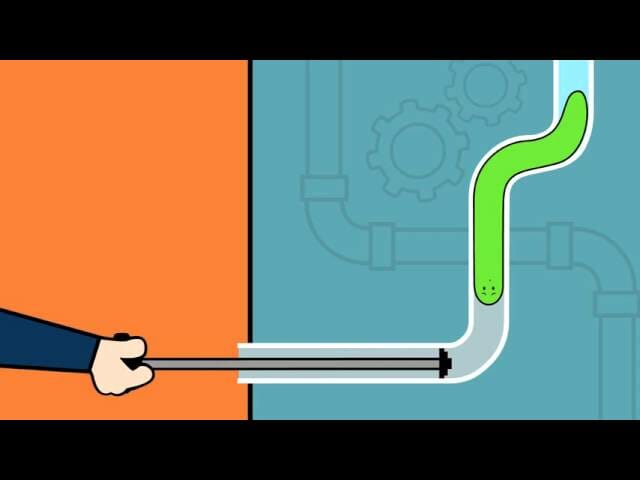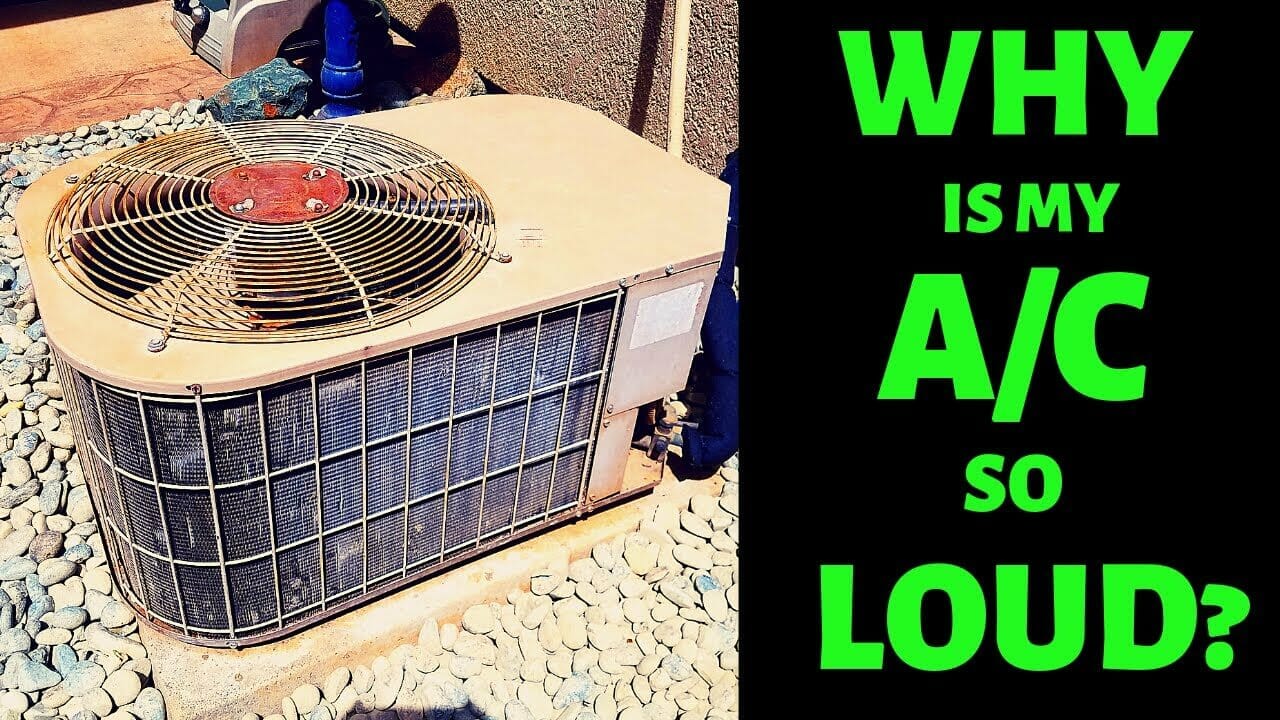Why Is My AC Making Noise When Off?
Whether your air conditioner is on or off, an annoying noise is the last thing you want to hear out of it on a hot and humid afternoon.
Typically, a buzzing noise, scraping sound, or even a loud slamming noise, indicates a potential major malfunction with your air conditioner. This is why if you are experiencing any of these loud noises, it is paramount that you turn your air conditioning unit off immediately and conduct some basic fault-finding exercises.
Don’t wait until the suspected noise coming from your AC has reached unbearable levels and your AC is not cooling and blowing warm air.
Now, if you’ve already turned your system off and you’re still experiencing your AC making noise when off, it could likely be related to some loose parts or even a problematic condensate pump.
Either way, you or a professional HVAC technician is going to have to investigate this issue with your AC making noise when off if you want your sanity back.
Why Does My AC Make Noise When It’s Off?
But, before you pick up the phone and dial the nearest HVAC technician to inspect any strange sounds coming from your air conditioner, let’s first conduct a little HVAC troubleshooting, and maybe even resolve this infuriating sound coming from your AC unit.
This largely depends on the noise that you are hearing and the type of air conditioner serving your conditioned space.
If the annoying noise being produced from your air conditioner when it’s off is an intermittent buzzing sound that eventually subsides, it is probable the condensate pump.
AC Condensate Pump Making Loud Noise
Condensate pumps are designed to drain away condensation produced via the evaporator coil and will continue to cycle on/off depending on the water level within the basin of the pump.
The noisy part of the pump (the motor) only turns on when the internal float switch (located in the basin) is activated by the water level within the basin increasing.
Condensate pumps tend to emit a rather loud buzzing sound when they’re running, and some buzz louder than others depending on the type of pump, and brand.
So in short, that irritating noise-related issue that is occurring when your air conditioner is off could very well be just how your AC functions normally.
Yeah, but why in the flying firetruck is that you ask?
Because condensate pumps generally continue to operate even when your air conditioner is turned off, draining away any residual condensate run-off that could be trickling into the pumps basin from the evaporator drain pan.
The good news is that changing out a faulty condensate pump is both cheap and easy. If you’ve got some limited electrical knowledge and a little DIY experience, you’ll get this done in an hour or two.
“Seven times out of ten, I’ve found the above to be the number one cause when it comes to air conditioners making noise when they’re turned off. But, if it’s none of the above, you could have a loose set screw (grub screw) on the indoor fan motor, which is a whole new can of worms.”
Kirk Humphry – Always Cool Air-Conditioning
Why Does My AC Make a Loud Noise When It Turns Off?
I’d put this down to a couple of likely causes after years of conducting fault-finding service calls related to noisy air conditioning systems.
A suspect loose set screw on the indoor fan motor shaft is not as simple as it sounds in terms of quick fixes.
If this is the case, the fan barrel which should be firmly fixed to the fan motor shaft will be vibrating vigorously when rotating, which can actually produce a noise more prominent when winding down.
Some other faults causing loud noises on shutdown could be worn v-belts on the indoor fan motor (if it’s not direct-drive) or fan/barrel alignment issues. If your indoor fan motor is out of alignment, you’ll hear a scraping sound, especially when starting up or slowing down.
In some instances, I’ve witnessed alignment issues where the fan barrel was actually scraping against the fan cowling producing a god-awful sound similar to Christina Aguilera’s Super Bowl XLV performance.
Issues related to fan motor alignment are typically caused by a loose set screw that has become slightly loose on the motor shaft or worn bearings. If the bearings are worn and the cause of the apparent noise, the noise will be constant, and even louder when the fan is at full speed.
When it comes to mechanical faults like; alignment issues with fan motors or worn bearings on fans/motors, it’s something you’ll probably have to seek professional advice to repair, unless you’re mechanically minded.
If you think your air conditioning unit’s noise-related issues are mechanically linked, I’d suggest calling a qualified HVAC technician to at least get a free quotation for further AC repair works.
This is especially so if you hear any abnormal or loud noises coming from your air conditioner compressor, as a major malfunction with any compressor is very costly.
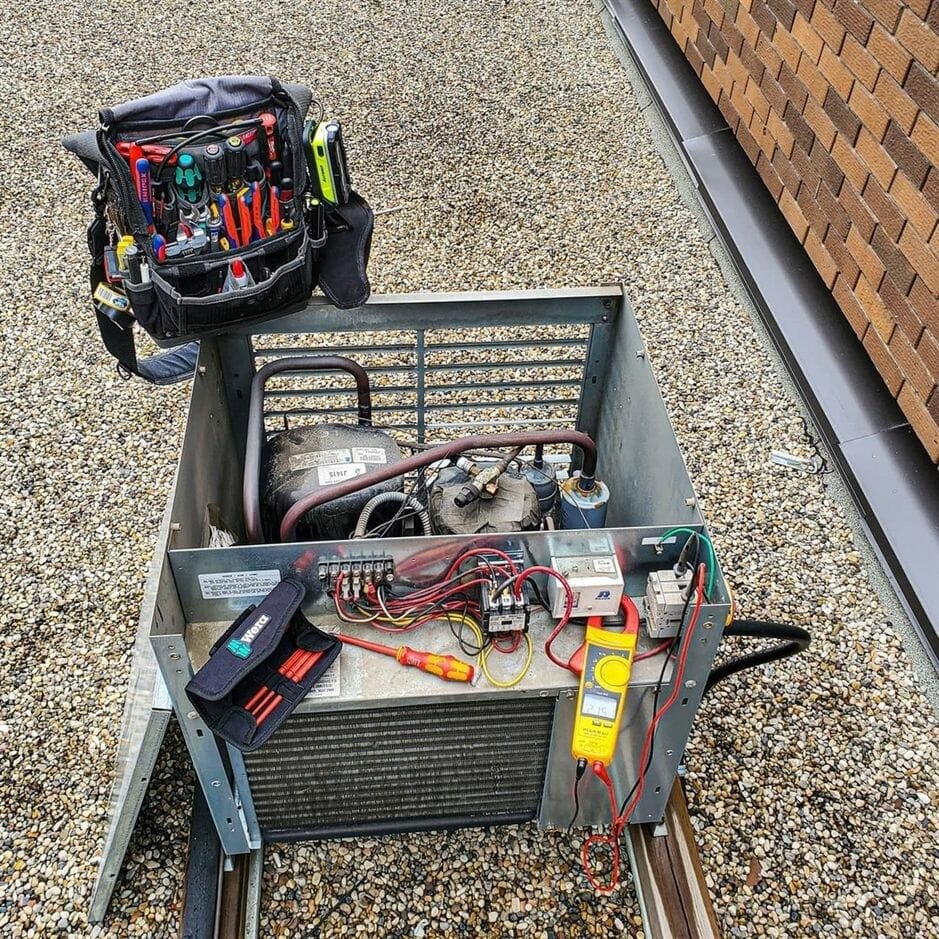
Why Does My AC Make a Loud Noise When It Turns On?
If this mystery loud noise coming from your AC unit only happens on start-up and then goes away, it could be related to your ductwork. When ductwork has been installed correctly to the highest of standards, contractors would have used insulation.
Insulation installed on ductwork doesn’t just prevent the ducting from sweating on high humidity days, it also acts as soundproofing. Ducting installed without insulation will produce a popping sound when the pressure increases and or decreases with the fan turning on/off.
To test out whether or not your ducting has insulation fitted to it, just grab a wooden broomstick and poke to see if it does flex or not. If it pops when you poke it, you might have to bite the bullet and fork out for some insulation.
Although, if it’s not the above, this is almost always due to a worn fan or motor bearings within the indoor unit. While a set of worn v-belts could also generate an unpleasant sound on start-up, they are generally only found on commercial-grade air handlers.
Worn bearings are a more serious sign of system failure and there is no quick fix. If you do suspect that your air conditioner has a faulty set of bearings, a loud humming noise could be something to look for to identify the root cause.
AC Making Loud Humming Noise
If your AC system is making a loud humming noise and no air is being discharged from the supply air outlet, this would indicate that the indoor fan motor is mechanically seized.
A seized fan motor is very common in HVAC equipment, be it on the indoor (evaporator) unit or outdoor (condenser) unit.
Generally, if the indoor or outdoor fan motor is seized, the internal overload safety switch or control circuit breaker will trip. These electrical protection devices are utilized within an AC system to prevent a load, like a fan motor, from drawing excessive amperage.
So what can cause a fan motor to mechanically seize-up delivering nothing but a loud humming noise and no airflow? Seized bearings either in the fan or motor will do the trick.
In residential air conditioners, bearings come sealed and packed with a small amount of grease. If the grease within the motor (or fan) overheats beyond its engineered temperature value, the grease will become ineffective, and the desired lubrication required won’t be administered when the motor is under load.
To help prevent this mechanical catastrophe from occurring, simply cleaning your return air filter every 3-6 months can go a long way in reducing any excessive load on your indoor fan motor. The same goes for your outdoor fan.
If the condenser coil becomes seriously blocked, the motor is going to have to work harder to drag more airflow over the coil.
In other words, keeping both your return air filter and condenser coil clean will most certainly help the overall longevity of your air conditioner.
AC Making Whistling Noise
Speaking of air filters, a whistling noise coming from your air conditioner is due to a restriction in return airflow. The purpose of a return air filter in any air conditioning system is to remove airborne particles passing over the evaporator coil.
Most people would assume that the return air filters are installed within an air conditioning system to protect the occupants in the conditioned space. Although that is not their intended purpose, it’s really just an additional benefit.
Thankfully, air filters in an AC unit do assist with reducing airborne contaminants for us human beings, but you should be making the effort to clean them, to maintain the maximum efficiency of your air conditioner.
Oh, and by removing your filters to either replace or wash with a garden hose, you’ll additionally prevent having to troubleshoot your AC due to vexing whistling noises.
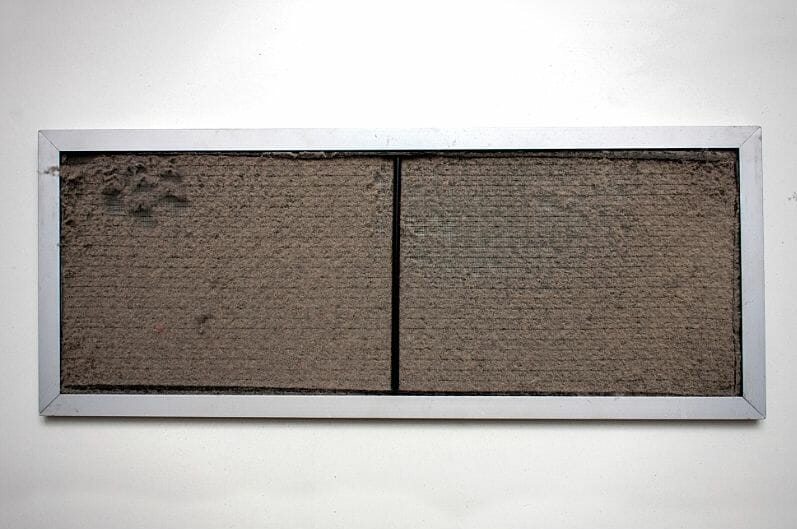
Air Conditioner Making a Clicking Noise
A sporadic clicking noise can be caused by a number of suspected faults. But one fault that comes to mind is a defective reversing valve solenoid. If a solenoid’s coil windings start to degrade, it will cause the reversing valve to intermittently seat and unseat, producing a sharp clicking sound.
So how would one remedy this annoying clicking sound and also ensure your air conditioning system continues to function correctly on both heating and cooling?
Simple, just replace the reversing valve solenoid. But, if that doesn’t work, and the clicking sound remains (and you’re also having issues with the functionality of the system), the reversing valve will need to be replaced.
Unfortunately, if it is the reversing valve and not just the solenoid, you’re going to be in for a very costly repair job.
Replacing a reversing valve is only a job that a professional HVAC technician should attempt. My suggestion would be to hunt around and get at least two quotes for these types of repair works and then make an executive decision from there.
“Most service calls I’ve attended for noise complaints are atypically due to issues with the indoor, and outdoor units. Be it a buzzing noise due to a seized fan motor, a slamming noise caused by a loose damper, a whistling sound as a result of a blocked air filter, or simply loose parts on the unit housing.”
Travis Fischer – Smardt
Air Conditioner Making Gurgling Noise When Off
This is really a non-event unless water starts leaking from your ceiling. That said, this strange gurgling noise that occurs when your air conditioner turns off is generally due to condensation (water) remaining in the P-Trap.
But, wait. What in the hell is a P-Trap and why should I care?
Well, a P-Trap is located on the condensate drain pipe and is attached to the discharge outlet from the evaporator drain pan. They are used in a ducted AC unit to stop condensate water from being sucked back into the air handler when the fan is running.
When your air conditioner is operating and the fan is running, it creates a vacuum within the air handler (fan chamber). When the fan turns off, this negative pressure within the air chamber turns positive.
As a result, when water is caught in the P-Trap and this pressure differential occurs, it will likely produce a gurgling noise. To eliminate or even diminish this unwanted gurgling noise, make sure that the drain pan, P-Trap, and condensate drain are free of any obstructions.
Here’s a quick video that provides instructions on how to unblock a condensate drain pipe:
Window AC Making Noise When Off
Window AC units are already noisy pieces of equipment and even at the best of times, produce more mechanical noise than any other home air conditioner.
This is because every major component within an air conditioning system is housed inside the conditioned space. With a split system, only the fan motor, refrigerant control device, electronic components, and maybe a condensate pump are fitted within the assembly.
Whereas with a window AC, everything from the compressor, to the condenser fan motor, and evaporator fan motor, are all encapsulated in one location.
So, unfortunately, if you own a window air conditioner, you’re going to experience all of the above mechanical noises in one location. Every time a reversing valve clicks or the refrigerant pressure equalizes within the system, you’ll experience it all in your living room or bedroom.
Sadly, window air conditioners are noisy contraptions by nature. If your window AC is functioning correctly delivering an adequate supply air temperature, there’s not a whole lot that can be done.
Although, if your window air conditioner is making a rattling, buzzing, or humming noise, it would be best to isolate the power supply and remove it from its housing for further troubleshooting.
Our most recent post on fault-finding a leaking window air conditioner covers how one would disassemble a window air conditioner.
In Conclusion
Now that you’re an expert when it comes to noisy air conditioners, you can either attempt to fix the issue at hand yourself or instead call in a professional.
As you might have noticed, I’ve made no mention of a compressor causing the suspected noise that is driving you nuts.
This is because the majority of households don’t make use of water-cooled package units and unless your compressor is mechanically stuffed beyond disbelief, you’re likely not going to hear a compressor inside the comfort of your home.
Whichever direction you go in to resolve this noise-related issue, you can now at least speak the necessary HVAC lingo. This will exhibit to the HVAC technician that you hire, that you know more than the average homeowner when it comes to HVAC.
Or, better yet, you can always attempt to fix your noisy AC unit yourself and save some cash in the process. Although keep in mind that you’ll need a few specialist HVAC tools if you’re going to get serious with DIY HVAC repair works.

